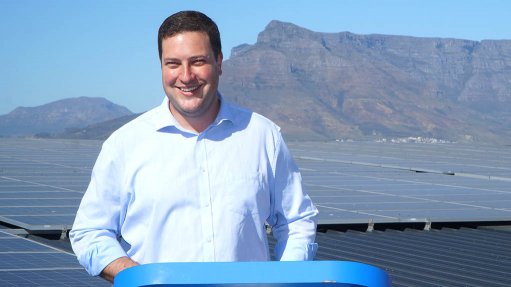
City of Cape Town Mayor Geordin Hill-Lewis
The City of Cape Town will raise the feed-in tariff for households and businesses selling power back to its grid by 10.15%, Mayor Geordin Hill-Lewis has said.
The mayor on Wednesday delivered Cape Town's budget speech before the council. The R69.9-billion budget targets spending in specific areas such as infrastructure, water and sanitation and energy.
The budget to end loadshedding over the next three years is R2.3-billion, he said.
"This amount includes R220-million over this three-year period on independent power purchases, as well as R288-million for our Power Heroes programme to incentivise Capetonians to use less power at peak times to help prevent loadshedding stages," Hill-Lewis said.
About R53-million of the budget will also go toward boosting the rollout of rooftop solar PV through the feed-in tariff. "Cape Town is also proud to be the first city in the country to offer households and businesses cash for their excess rooftop solar power. And I am pleased to announce that we are proposing to raise this feed-in tariff by 10.15%," Hill-Lewis said.
The current tariff approved by the National Energy Regulator of South Africa is 78.98c/kWh. The city's incentive (on top of the tariff) of 25c/kWh remains as it is.
"This makes solar even more attractive. We want as many residents and businesses as possible to help us end load shedding over time, and there are no limits to how much power you can sell us," Hill-Lewis said.
So far, the excessive load shedding and the city's own policy changes have seen a record amount of solar PV applications and installations.
January and February account for 11% of all solar PV applications since the city's records began in 2018. The solar PV installations that occurred during these two months also account for 10% of all installations in Cape Town in the past five years, News24 previously reported.
Last week during the Western Cape government's Digicon on the climate crisis, Hill-Lewis said that plans are afoot to bring down the price of the specialised meter that enables the feed-in of power to the grid. Prices go for around R13 000. There is also a meter-reading fee of R96.20 (applicable to the 2022/23 financial year) which covers the cost for the infrastructure to do the remote meter reading and then upload the data to the billing system, News24 previously reported.
The city has also budgeted R1-billion over the medium term to operate and maintain the Steenbras pumped-storage hydroelectric plant, which so far has been useful in shielding Cape Town residents from one stage of loadshedding.
"This is a critical part of the city's load shedding resilience, and the fact that this 44-year-old station performs so well is testament to the power of regular and thorough maintenance," Hill-Lewis said of the continued investment in Steenbras.
"Our capital expenditure on solar PV installations will amount to R636-million over the three years, and we have set aside R50-million for battery storage and R32-million for our waste-to-energy programme at landfills," the mayor added.
"We are confident that Cape Town will be the first metro to break free from the suffocating hold that Eskom has placed on our country, and in doing so, we will show that there is a bright electric light at the end of this Eskom tunnel."
Loadshedding cost the city R390-million in the current financial year. These are costs that go toward generators, fuel, security, overtime and losses due to theft, vandalism and lower electricity sales.
Bigger subsidies
Additionally, Cape Town will shield residents against Eskom's 18.49% increase for municipalities. This instead will be reduced to 17.6% as the City will absorb the extra cost. "I know that this is a small consolation, and it underscores how important it is to move away from Eskom dependency as fast as we possibly can," he said.
For low-income households, or "lifeline customers", subsidies for electricity will increase. The current threshold is 350 units, but this will be raised to 600 units. "Under the old threshold, customers consuming more than 350 units would pay R3.71. Because of the Lifeline shift we are making today, those customers will now pay R1.84," Hill-Lewis said. In other words, they can purchase an additional 250 units in a month at the lower tariff.
The increase was introduced to allow these customers to use more power during winter months, but the average monthly consumption limit of 450 units (over the course of a year) still applies for them to remain within this tariff category.
The subsidies come at the cost of R46-million.
Bolstering infrastructure spend
The city has also allocated R10.9-billion to boost infrastructure.
"That's more than was spent in the 2010 World Cup with all its mega projects, and it's 40% up from this year's budget. In the last eight years, the most we've ever spent on infrastructure is R6.5-billion," said Hill-Lewis.
"… From 1 July, we plan to build R30-million of infrastructure every single day of the year, including weekends," he added.
In subsequent years, the city will continue to increase its infrastructure spend to R14-billion next year and to R18-billion for the year after that."…Over the next 10 years, we will spend R120-billion on infrastructure projects, the bulk of which will go towards upgrading and expanding water and sanitation infrastructure across the metro," Hill-Lewis said.